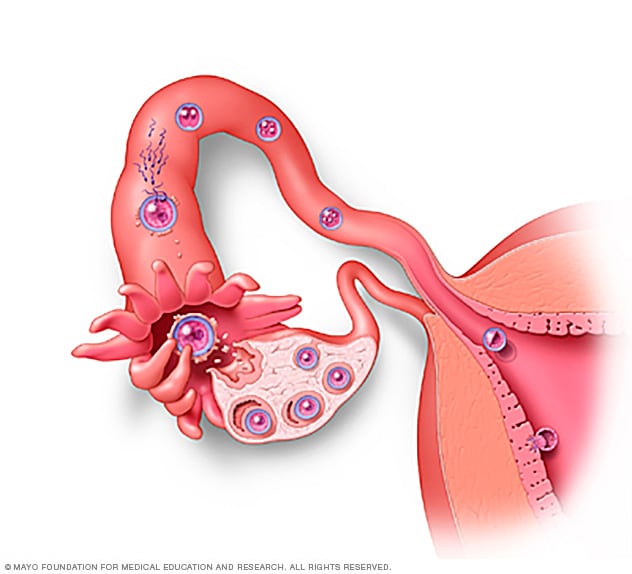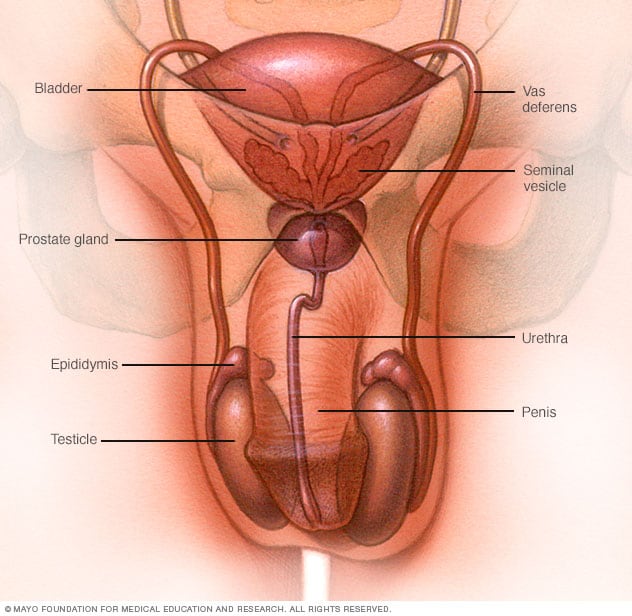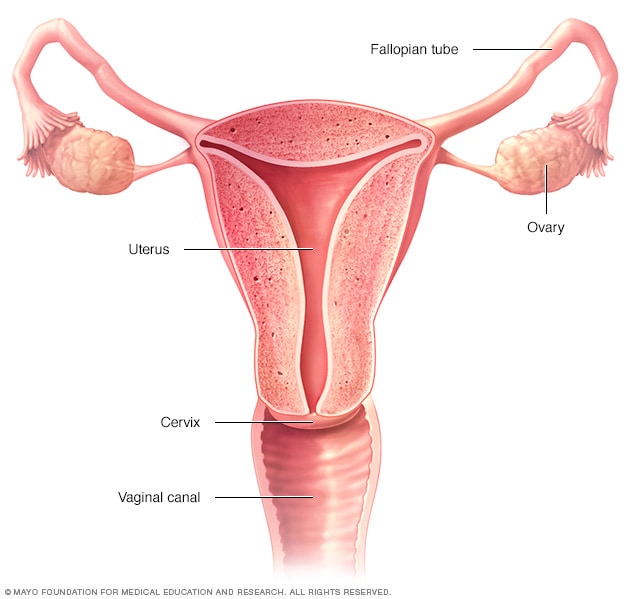Overview
If you and your partner are struggling to have a baby, you're not alone. In the United States, 10% to 15% of couples are infertile. Infertility is defined as not being able to get pregnant despite having frequent, unprotected sex for at least a year for most couples.
Infertility may result from an issue with either you or your partner, or a combination of factors that prevent pregnancy. Fortunately, there are many safe and effective therapies that significantly improve your chances of getting pregnant.
Products & Services
- Book: Mayo Clinic Guide to Fertility and Conception
Symptoms
The main symptom of infertility is not getting pregnant. There may be no other obvious symptoms. Sometimes, a woman with infertility may have irregular or absent menstrual periods. In some cases, a man with infertility may have some signs of hormonal problems, such as changes in hair growth or sexual function.
Most couples will eventually conceive, with or without treatment.
When to see a doctor
You probably don't need to see a doctor about infertility unless you have been trying regularly to get pregnant for at least one year. Women should talk with a doctor earlier, however, if they:
- Are age 35 or older and have been trying to conceive for six months or longer
- Are over age 40
- Have irregular or absent periods
- Have very painful periods
- Have known fertility problems
- Have been diagnosed with endometriosis or pelvic inflammatory disease
- Have had multiple miscarriages
- Have undergone treatment for cancer
Men should talk to a doctor if they have:
- A low sperm count or other problems with sperm
- A history of testicular, prostate or sexual problems
- Undergone treatment for cancer
- Small testicles or swelling in the scrotum
- Others in your family with infertility problems
Request an Appointment at Mayo Clinic
Causes
All of the steps during ovulation and fertilization need to happen correctly in order to get pregnant. Sometimes the issues that cause infertility in couples are present at birth, and sometimes they develop later in life.
Infertility causes can affect one or both partners. In general:
- In about one-third of cases, there is an issue with the man
- In about one-third of cases, there is an issue with the woman
- In the remaining cases, there are issues with both the man and the woman, or no cause can be found
Causes of male infertility
These may include:
- Abnormal sperm production or function due to undescended testicles, genetic defects, health problems such as diabetes, or infections such as chlamydia, gonorrhea, mumps or HIV. Enlarged veins in the testes (varicocele) also can affect the quality of sperm.
- Problems with the delivery of sperm due to sexual problems, such as premature ejaculation; certain genetic diseases, such as cystic fibrosis; structural problems, such as a blockage in the testicle; or damage or injury to the reproductive organs.
- Overexposure to certain environmental factors, such as pesticides and other chemicals, and radiation. Cigarette smoking, alcohol, marijuana, anabolic steroids, and taking medications to treat bacterial infections, high blood pressure and depression also can affect fertility. Frequent exposure to heat, such as in saunas or hot tubs, can raise body temperature and may affect sperm production.
- Damage related to cancer and its treatment, including radiation or chemotherapy. Treatment for cancer can impair sperm production, sometimes severely.
Causes of female infertility
Causes of female infertility may include:
- Ovulation disorders, which affect the release of eggs from the ovaries. These include hormonal disorders such as polycystic ovary syndrome. Hyperprolactinemia, a condition in which you have too much prolactin — the hormone that stimulates breast milk production — also may interfere with ovulation. Either too much thyroid hormone (hyperthyroidism) or too little (hypothyroidism) can affect the menstrual cycle or cause infertility. Other underlying causes may include too much exercise, eating disorders or tumors.
- Uterine or cervical abnormalities, including abnormalities with the cervix, polyps in the uterus or the shape of the uterus. Noncancerous (benign) tumors in the uterine wall (uterine fibroids) may cause infertility by blocking the fallopian tubes or stopping a fertilized egg from implanting in the uterus.
- Fallopian tube damage or blockage, often caused by inflammation of the fallopian tube (salpingitis). This can result from pelvic inflammatory disease, which is usually caused by a sexually transmitted infection, endometriosis or adhesions.
- Endometriosis, which occurs when endometrial tissue grows outside of the uterus, may affect the function of the ovaries, uterus and fallopian tubes.
- Primary ovarian insufficiency (early menopause), when the ovaries stop working and menstruation ends before age 40. Although the cause is often unknown, certain factors are associated with early menopause, including immune system diseases, certain genetic conditions such as Turner syndrome or carriers of Fragile X syndrome, and radiation or chemotherapy treatment.
- Pelvic adhesions, bands of scar tissue that bind organs that can form after pelvic infection, appendicitis, endometriosis or abdominal or pelvic surgery.
- Cancer and its treatment. Certain cancers — particularly reproductive cancers — often impair female fertility. Both radiation and chemotherapy may affect fertility.
More Information
- Infertility care at Mayo Clinic
- Secondary infertility
- Semen allergy: A cause of infertility?
Risk factors
Many of the risk factors for both male and female infertility are the same. They include:
- Age. Women's fertility gradually declines with age, especially in the mid-30s, and it drops rapidly after age 37. Infertility in older women is likely due to the lower number and quality of eggs, and can also be due to health problems that affect fertility. Men over age 40 may be less fertile than younger men.
- Tobacco use. Smoking tobacco or marijuana by either partner may reduce the likelihood of pregnancy. Smoking also reduces the possible effectiveness of fertility treatment. Miscarriages are more frequent in women who smoke. Smoking can increase the risk of erectile dysfunction and a low sperm count in men.
- Alcohol use. For women, there's no safe level of alcohol use during conception or pregnancy. Alcohol use may contribute to infertility. For men, heavy alcohol use can decrease sperm count and motility.
- Being overweight. Among American women, an inactive lifestyle and being overweight may increase the risk of infertility. For men, sperm count also may be affected by being overweight.
- Being underweight. Women at risk of fertility problems include those with eating disorders, such as anorexia or bulimia, and those who follow a very low-calorie or restrictive diet.
- Exercise issues. A lack of exercise contributes to obesity, which increases the risk of infertility. Less often, ovulation problems may be associated with frequent strenuous, intense exercise in women who are not overweight.
Prevention
Some types of infertility aren't preventable. But several strategies may increase your chances of pregnancy.
Couples
Have regular intercourse several times around the time of ovulation for the highest pregnancy rate. Intercourse beginning at least five days before and until a day after ovulation improves your chances of getting pregnant. Ovulation usually occurs in the middle of the cycle — halfway between menstrual periods — for most women with menstrual cycles about 28 days apart.
Men
Although most types of infertility aren't preventable in men, these strategies may help:
- Avoid drug and tobacco use and drinking too much alcohol, which may contribute to male infertility.
- Avoid high temperatures found in hot tubs and hot baths, as they can temporarily affect sperm production and motility.
- Avoid exposure to industrial or environmental toxins, which can affect sperm production.
- Limit medications that may impact fertility, both prescription and nonprescription drugs. Talk with your doctor about any medications you take regularly, but don't stop taking prescription medications without medical advice.
- Exercise moderately. Regular exercise may improve sperm quality and increase the chances for achieving a pregnancy.
Women
For women, a number of strategies may increase the chances of becoming pregnant:
- Quit smoking. Tobacco has many negative effects on fertility, not to mention your general health and the health of a fetus. If you smoke and are considering pregnancy, quit now.
- Avoid alcohol and street drugs. These substances may impair your ability to conceive and have a healthy pregnancy. Don't drink alcohol or use recreational drugs, such as marijuana, if you're trying to get pregnant.
- Limit caffeine. Women trying to get pregnant may want to limit caffeine intake. Ask your doctor for guidance on the safe use of caffeine.
- Exercise moderately. Regular exercise is important, but exercising so intensely that your periods are infrequent or absent can affect fertility.
- Avoid weight extremes. Being overweight or underweight can affect your hormone production and cause infertility.
By Mayo Clinic Staff
For accurate assessment of your fertility situation, contact us at JOAS MEDICAL DIAGNOSTIX, Ikotun Lagos Nigeria.
For FREE Consultation and FREE Counseling. Also for Quality and Accurate Medical Diagnostic Tests Contact
JOAS MEDICAL DIAGNOSTIX
JOAS MEDICAL DIAGNOSTIX
JOAS MEDICAL DIAGNOSTIX——-WE ARE AN ULTRAMODERN MEDICAL IMAGING CENTER. WE ARE EXPERTS IN ULTRASOUND SCAN SERVICES, 3D/4D COLOUR DOPPLER SCAN SERVICES, X-RAY/RADIOLOGY SERVICES, ECG SERVICES, INFERTILITY SERVICES, HSG SERVICES, LABORATORY SERVICES,BLOOD BANKING SERVICES , DNA SERVICES, AND HEALTH CONSULTANCY/COUNSELLING SERVICES.
We are located at
JOAS HOUSE, 2, Okesuna Street,
Opposite The Synagogue Church Busstop,
Bolorunpelu, Ikotun, Lagos
Postcode: 100265
Nigeria.
Opposite The Synagogue Church Busstop,
Bolorunpelu, Ikotun, Lagos
Postcode: 100265
Nigeria.
TEL:
08064981455
08032509975
08184590752
08037668535
08064981455
08032509975
08184590752
08037668535
EMAIL:
joasmedicaldiagnostix@yahoo.com
joasmedicaldiagnostix@gmail.com
joasmedicaldiagnostix@yahoo.com
joasmedicaldiagnostix@gmail.com
DISCLAIMER
The contents, blogs and postings provided in this site are offered strictly for informational purposes only and should not be construed as legal, medical nor financial advice on any matter. We have made every effort to ensure the accuracy of the information presented, and if you have any questions regarding the contents please contact us.
The informations provided in this site is subject to change without notice.
This site may contain links to other internet sites, we are not responsible for the privacy, practices nor the content of such sites, nor their relationships


